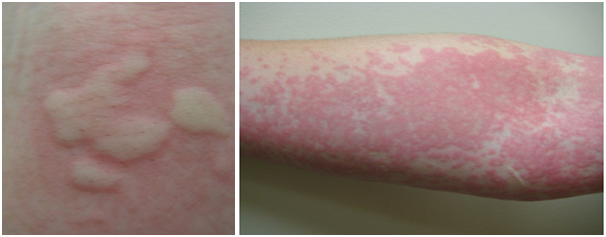Bolgs Detail

Skin allergies and Urticaria
Skin allergies are a group of conditions caused by hypersensitivity of the immune system to typically harmless substances in the environment. There are several types of allergic skin conditions such as urticaria, contact dermatitis etc. Skin allergy is caused by contact with trigger factors like dust, mites, pollen, animal dander, soap, chemicals, food and drugs. Some people have very obvious triggers while other people have difficulty determining the source of allergy.
Urticaria/Hives-Hives are a red, raised, itchy skin rash that is sometimes triggered by an allergen. An allergen is something that produces an allergic reaction. It is also known as urticaria, welts, weals, or nettle rash. When an allergic reaction occurs, the body releases a protein called histamine. When histamine is released, the tiny blood vessels known as capillaries leak fluid. The fluid accumulates in the skin and causes a rash. Hives affect around 20 percent of people at some time in their life. It is not contagious. Urticaria may be classified as acute (less than 6 weeks) and chronic (more than 6 weeks).
Triggers-Medications, including some antibiotics and non-steroidal anti-inflammatory drugs(NSAIDs), such as aspirin and ACE inhibitors, used for high blood pressure, foods such nuts, shellfish, food additives, eggs, strawberries, and wheat products, infections, including influenza, the common cold, glandular fever, and hepatitis B, bacterial infections, including urinary tract infections and streptococcal throat infections, , intestinal parasites extreme temperatures or changes in temperature, high body temperature, pet dander from dogs, cats, horses, and so on, dust mites, latex, pollen, insect bites and stings, some chemicals, chronic illness, such as thyroid disease or lupus, sunlight exposure etc.
Signs & symptoms-
Skin Allergies- In skin allergies, patient experience rashes, itching, redness, swelling, scaling or flaking of skin and cracked skin. Treatment of Skin allergies includes avoiding allergens, taking preventive medicine such as antihistamines and managing symptoms as they arise.
Urticaria
Urticaria is the most common allergic skin diseases. It usually starts with swollen, red wheals with clearly defined borders on the skin that appear suddenly either as a result of the body's reaction to certain allergens or for unknown reasons. Symptoms come and go quickly or sometimes it may be long lasting. Antihistamines and corticosteroids are typically used to treat urticaria.
Skin Allergies and Urticaria can be correlated to Shitapitta vyadhi described in Ayurveda. Sheetapitta is a skin disorder characterized by inflamed skin lesions associated with Kandu (itching), Daha (burning sensation), Toda (pricking sensation), Vamana (vomiting) or Jwara (fever). Exposure to cold air causes vitiation of Vata and Kapha dosha along with Pitta Dosha and spreads into the Rakta Dhatu causing Shitpitta or Urticaria.
Ayurvedic Treatment of Skin allergies and Urticaria
Panchakarma treatment such as Abhyanga (massage) with mustard oil, Swedana (fomentation), Raktamokshan (Bloodletting), Vaman (medically induced emesis) and Virechana (medically induced purgation) are known to be effective in treating skin allergies and Urticaria. Medicines having Ushna, Tiksha, Ama Pachak and Vatanuloman properties are excellent for vitiated Vata-Kapha doshas. Maricha, Haridra and Haridra khanda are used to treat skin allergies and Urticaria.
Dr. Kohli has successfully treated large number of patients suffering from skin allergies and urticaria with customized Ayurvedic treatments. The frequent episodes of urticaria and allergic flare ups reduced significantly in many patients after customized Ayurvedic treatments. Urticaria and other skin allergies almost get an extensive relief with Ayurveda.












